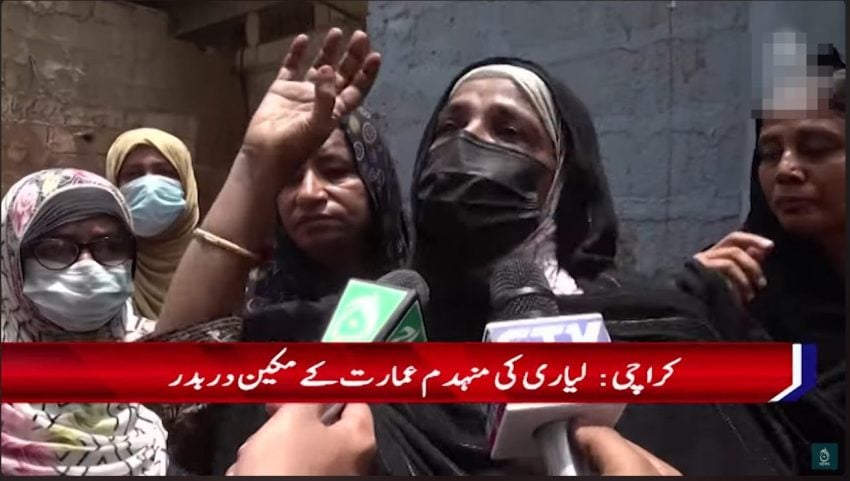A devastating five storey residential building in Lyari’s Baghdadi area collapsed on Friday, July 4, 2025, killing 27 people—15 men, nine women, and two children—and leaving dozens more homeless. While the search and rescue operation concluded after 60 hours, families are now grieving the loss of loved ones and all their belongings, forced to take shelter under the open sky with little clarity about their future.
Nearby buildings declared structurally unsafe have also been evacuated, displacing almost 50 more families.
Men, women, and children—all vulnerable and exposed—are now at risk of serious mental and physical hardship. Men may struggle with sudden unemployment, loss of identity, and pressure to rebuild. Women often face heightened threats of harassment, lack of privacy, disrupted access to sanitation, and reproductive healthcare. Children suffer emotional trauma, interrupted schooling, malnutrition, exposure to disease, and injury—especially if seeking refuge in unsanitary, overcrowded shelters.
Local institutions like the Edhi Foundation, Chhipa, and Rescue 1122 have been at the forefront of rescue and medical response. But addressing longer-term needs requires combined action from INGOs and national NGOs.
International organizations can bring technical expertise, funding, shelter solutions, education packs, protection services, psychosocial care, and livelihood programs. Local NGOs and community-based groups can facilitate immediate cash grants, hygiene kits, women-safe spaces, legal assistance for building claims, and community-based monitoring.
Coordination is essential: INGOs can collaborate with municipal authorities—already inspecting over 50 unsafe buildings—to map needs, avoid duplication, and push for rapid repairs and relocations . Local NGOs can engage community leaders to foster trust, especially among women and children who may face marginalization or threats of sexual violence if left unsheltered. Establishing temporary child friendly spaces and ensuring safety mechanisms (lighting, monitoring, legal escorts) is vital.
An urgent humanitarian appeal could also prompt national NGOs to scale up shelter relief, rapid cash assistance, and survivor rehabilitation—with INGOs supplementing with flood proof tents, shelter monitoring, protection teams, and livelihood grants. Psychological trauma counseling—particularly for children who lost peers or parents—must be prioritized alongside rebuilding efforts.
This tragedy highlights a broader issue: Karachi has nearly 600 buildings labelled “extremely dangerous,” including over 450 in District South alone. While the provincial government has begun inspecting and evacuating unsafe buildings and promising relocations, many displaced families remain uncertain.
Immediate multisectoral humanitarian aid—combining emergency shelter, mental health services, protection for women and children, and rebuilding livelihoods—is essential. Local NGOs’ grassroots knowledge, when paired with INGOs’ technical support and funding, can provide a lifeline to the many men, women, and children now sleeping under the open sky in Lyari. Ensuring safe, dignified recovery requires a coordinated international-local NGO response alongside government action.














